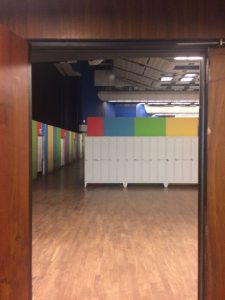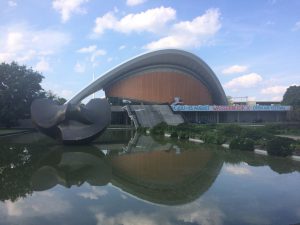This summer, Elise Shea, Professor Hoehn, and I conducted research into Germany’s ability to handle the arrival of over 1.5 million refugees since the beginning of 2015. With its large bureaucracy and numerous social programs, many refugees view Germany as their best option for restarting their lives. We took the summer as an opportunity to better understand the actions Germany are taking on the Federal, State, and local level to determine what has been successful and where the state is failing the people. Through this research we built connections and found pathways for Vassar Refugee Solidarity, the Mid-Hudson Refugee Solidarity Alliance, and the Consortium on Forced Migration, Displacement and Education to provide various services and initiatives that could pick up some of the slack of the German government. This summer project also provided the opportunity for us to return to the grass-root level. We had the opportunity, through various conferences and personal connections, to meet many people with forcibly displaced backgrounds, and to gain knowledge and understanding from them about what we as individuals, and as the organizations and universities we represent, can do to help.
Throughout the summer we attended various conferences and workshops. We started our time in Berlin with a workshop at Bard College Berlin where we talked with other Members of the Consortium, as well as other small liberal arts colleges and exchanged ideas and projects to find points of collaboration and receive feedback. It was at this workshop that we learned about BCB’s Arabic 101 program that looks to provide a space for community members and refugees to come together and discuss their daily trials and tribulations. The same week, we attended the 10-day Conference called Germany, Europe, and the Refugee Crisis: The Challenge to Integrate. This conference gave us a great introduction into the world of the German bureaucracy where we met with the DAAD, the Friedrich Ebert Foundation, and a member of the German Foreign Office. Although on one hand, the bureaucracy provides various critical services, it also can be very limiting in what services organizations could provide, as they have to stay within a very tight box in order to maintain their funding from the German government. This conference introduced us to various professors and academics from universities around the United States and proved to be a great intellectual opportunity for us.
From these two conferences and from the various other workshops we attended, we were eventually introduced to an amazing NGO in Berlin called the ReDI School for Digital Integration. Due to their prime location, wifi, and numerous computers, the ReDI school seems to be our best opportunity for continued collaboration through our various digital initiatives. While the entire summer experience has been very informative and helpful, finding and meeting this amazing NGO has really been the icing on the cake of this summer experience! I am looking forward to returning to Vassar to continue pursuing our new connections.
Right: The refuge e home in Messe Nord at the ICC. Most of the people
e home in Messe Nord at the ICC. Most of the people live in this large room together. The “homes” are 10×10 squares partitioned off by plywood and have no roof. The lights are on from 6am – midnight. Each person gets one small locker for their belongings. Left: The House of World Cultures where the Face It! Konferenz took place. This conference focused on the topics of power-sharing, the production of knowledge, and the questions of what is political and who can be political.
live in this large room together. The “homes” are 10×10 squares partitioned off by plywood and have no roof. The lights are on from 6am – midnight. Each person gets one small locker for their belongings. Left: The House of World Cultures where the Face It! Konferenz took place. This conference focused on the topics of power-sharing, the production of knowledge, and the questions of what is political and who can be political.
